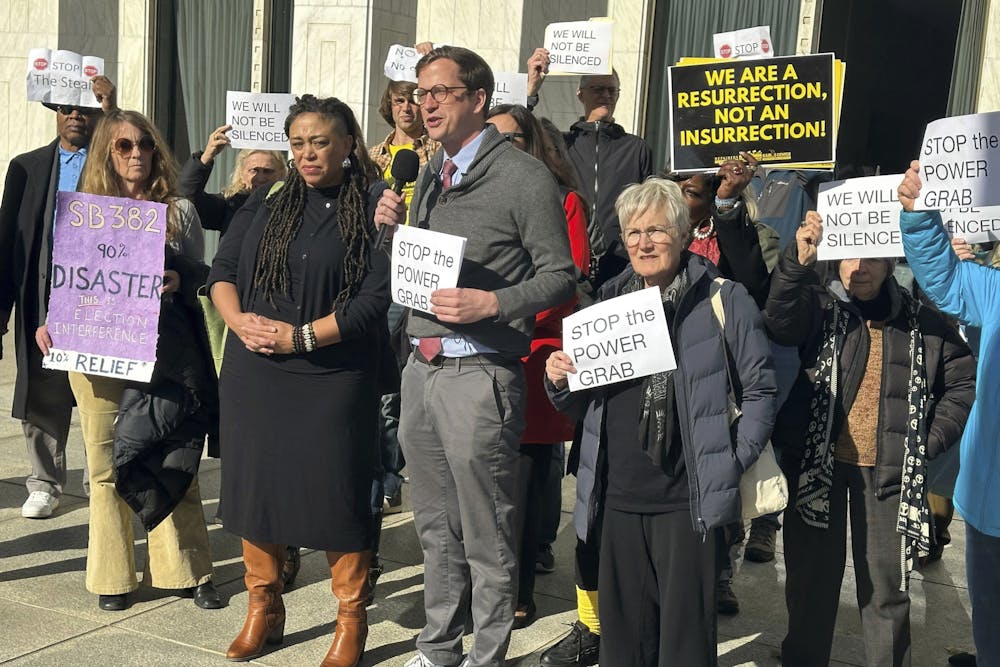Republican members of the North Carolina General Assembly recently overrode two vetoes from Democratic Gov. Roy Cooper, moving the controversial bills closer to becoming law.
Senate Bill 382 allocates more funding for Hurricane Helene relief while also reducing the governor’s and attorney general’s powers and reforming some judicial appointments. It was overridden Monday by the state Senate and now goes to the state House of Representatives for consideration.
House Bill 10 expands private school vouchers and mandates local law enforcement cooperation with Immigration and Customs Enforcement (ICE). It was overridden by Republican supermajorities in both chambers, sending the law into effect.
Senate Bill 382
Titled “Disaster Relief-3/Budget/Various Law Changes,” S.B. 382 was passed Nov. 20 and aims to limit the power of several statewide offices won by Democrats in November. It would also provide extended relief for counties affected by Hurricane Helene, appropriating an additional $252 million from state reserves on top of an existing $900 million disaster relief fund.
The bill was quickly vetoed six days later by Cooper. Several Democrats argued that the relief measures were minimal and merely incorporated to ensure the bill’s passage.
“This bill makes it pretty clear that the body is prioritizing political priorities over the very real need for rapid assistance in the western part of our state,” Democratic Rep. Eric Ager said.
The bill would transfer the governor’s power to appoint members of the North Carolina State Board of Elections to the state auditor, an office which Republican Dave Boliek will assume in January. Democrats would likely lose their 3-2 majority on the NCSBE as a result, allowing the GOP majority to decide voting procedures like mail-in ballot submission deadlines and provisional ballot requirements.
Critics have raised concerns that the move could politicize the NCSBE, undermining its neutrality.
Some voting rights groups argue that placing appointment power in the hands of the state auditor, a partisan office, could lead to decisions that disproportionately affect certain voter demographics, including historically marginalized communities.
S.B. 382 also mandates that the governor choose from a set of three predetermined candidates to fill judicial vacancies on the N.C. Supreme Court and the state Court of Appeals. Candidates must be “qualified persons” recommended by an executive committee of the same political party as that of the vacating judge.
The proposed bill restricts the state attorney general’s power to challenge or intervene in cases involving the state, even in situations where such action may be deemed necessary to address legislative proceedings.
The bill would also abolish the N.C. Courts Commission, a political body that reviews and recommends changes to the structure of the Judicial Department and the General Court of Justice.
Senate President Pro Tempore Phil Berger, a Republican and strong proponent of the bill, pushed back on critics in a press release, arguing that S.B. 382 would “balance our three branches of state government so that North Carolina remains on a positive trajectory, free from Democratic Party and liberal activist obstruction.”
House Bill 10
Titled “Require ICE Cooperation and Budget Adjustments,” H.B. 10 mandates county sheriff cooperation with ICE and appropriates $463 million to private school vouchers, which provide government funding for parents to enroll their children in private schools.
Cooper vetoed the bill Sept. 20, but the state Senate overrode his decision Nov 20. The House moved the following day to complete the override.
Under H.B. 10, all county sheriffs in North Carolina are required to comply with ICE U.S. detainer requests. Local law enforcement agencies must assist in federal immigration enforcement by holding individuals for the ICE, even without a warrant from a court.
Although several county sheriffs were already voluntarily cooperating with ICE requests, Republicans were concerned primarily with sheriffs from more populous counties — including Wake, Durham, Mecklenburg, Orange and Guilford — who have openly refused to cooperate with ICE detainers.
A group of county sheriffs had expressed concerns over the law when it was first proposed in a letter to the NCGA, arguing that the mandates would lead to overburdening of local police departments and instill fear in minority communities.
Get The Chronicle straight to your inbox
Sign up for our weekly newsletter. Cancel at any time.
"I question why anyone in law enforcement — these elected sheriffs — would deny a community the safety that is allowed by taking the process in this way,” Berger said.
Cooper successfully vetoed similar legislation that was passed in 2019.
H.B. 10 also expands support for private school vouchers with $463 million in new funding for the state's Opportunity Scholarship Program. The expansion aims to eliminate the existing waitlist of approximately 54,000 students seeking vouchers to attend private schools.
Critics, including Democratic lawmakers and public education advocates, contend that diverting substantial public funds to private institutions undermines the state’s public education system. They expressed concerns that the bill would exacerbate existing inequities, particularly for under-resourced public schools that serve the majority of North Carolina's students.
“Our students deserve strong, well-funded schools right here at home, not a system that incentivizes them to leave,” said Carlos Riddick, chairman of the Washington County Board of Education. “House Bill 10 doesn’t just redirect taxpayer money — it weakens the backbone of our county by undermining public education.”
Cooper wrote in a Sept. 20 statement that such vouchers take taxpayer dollars from public schools and give them to “wealthy families.” He cited studies showing that such vouchers “do not improve student performance” and claimed that North Carolina’s voucher scheme has “the least accountability in the country.”

